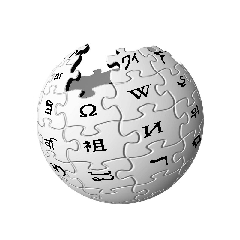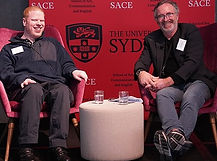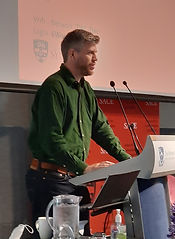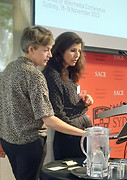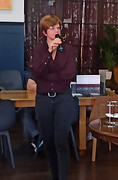Abstracts
Joseph Ballesteros, Belinda Ballesteros & Michael Glen Ong: Open Knowledge using Indigenous Language – the Waray Wikipedia Experience
Waray Wikipedia, an edition of Wikipedia written in the Waray language of the Philippines, is an open platform that contains open knowledge, the contents of which are contributed voluntarily by registered and anonymous users as well lsjbot which is an automated Wikipedia article-creating program. Since the inception of Waray Wikipedia in September 2005, the number of users who registered per year ranges from 16 to 87. The average number of active editors in a month increased from 2 in 2005 to 14 in 2021. They have contributed about a minimum of six new articles per day from 2009 to 2013 and at least one new article in a day from 2005 to 2007, 2014, and 2016. On the other hand, anonymous users contributed a minimum of two new articles in a day in 2005, from 2016 to 2018, and in 2020 and one new article per day in 2014, 2015, 2019, and 2021. While lsjbot was adding 1,143,002 articles in Waray Wikipedia from 2013 to 2014, registered users and anonymous contributors were also creating a total of 4,011 new articles during the same time. In the eight edit-a-thons that contributed about 644,638 characters to Waray Wikipedia, at least one from each event continued editing. Pageviews of Waray Wikipedia have been increasing at an average annual growth rate of 40% with desktop computers as the most commonly used devices. Waray Wikipedia answers the need of the Waray-speaking community for free information that is written in a language that they easily understand.
I Gede Gita Purnama Arsa Putra & Dewa Ayu Carma Citrawati: Challenges and Rescue Balinese Manuscripts (Lontar) on the Balinese Wikisource by Creating Metadata, Cataloging, and Digitizing.
Large number of Lontars (palm leaf manuscripts) written in Balinese script are discovered around the area of Bali. Lontar are manuscripts that contain indigenous knowledge such as folk medicine, astrology, literature, philosophy, and so much more. Today, only several Balinese people fully understand or read in Balinese script. Lontar found in the community are in poor condition due to a lack of understanding about manuscript preservation. Therefore, the Denpasar Wikimedia Community began tiny initiatives to conserve Lontar by collecting Lontar data and exploring several locations in Bali to persuade Lontar owners of the necessity of preserving Lontars. The rescue was accomplished by initiating a pilot project called WikiLontar and developing a Bali Wikisource site named WikiPustaka. The WikiLontar project is a community-led experimental project that makes use of wikidata and wikisource. Wikidata is used to create metadata for Lontars, while wikisource is used to verify Lontars readability. WikiLontar and WikiPustaka have given a new beginning to the rescue of Lontar in Bali, which may now be appreciated by Lontars owners, Balinese, and the younger generation. It is the first project that encountered a number of issues and challenges. The most difficult challenge in this project was persuading the lontar's owner, who still believed that the Lontars was a sacred object that should not be opened yet the lontars' condition needed to be rescued quickly! Now, WikiPustaka is becoming one of the sites used to maintain Lontars data, as well as a study location for Balinese students interested in Lontars.
Lisa Maule & Sophia Coghini: Pasifika arts & Wikipedia
The value of Wikipedia as accessible knowledge is appreciated within Pacific Island communities in Aotearoa yet there is a lack of content and editors contributing to Wikipedia about any Pacific Island subjects. As the Indigenous Peoples of the Pacific, information gathered, researched, and shared is best created by Pacific Island people. (Smith, 2012).
This paper describes a project that created incentives to increase Wikipedia editing knowledge about Pacific Island artists in Aotearoa. At the core of the project was the Wikipedia article ‘Arts Pasifika Awards’ that has many ‘redlinks’. Coaching of three Pacific Island people about Wikipedia was enabled by support from Creative New Zealand (the government arts funding body). Each person developed a personalised project with targets including new articles and outreach conversations.
The running of this project led to insights in two particular areas: different learning and editing approaches to Wikipedia and the range of ways to successfully on-board new editors; and the impact on editing of what is and what isn’t published in reliable secondary sources on notable people.
Given the broad diaspora of nations of the Pacific and Aotearoa there is a weave of connection to and between Pacific Islands. There is potential for the encyclopaedic statements in Wikipedia to be a grounding of inspiration and research for Pacific Island people, and Pacific Island artists were positive in their response for information about them and their arts to be in Wikipedia
Philip Egbule & Juliet Ossai. Feminists’ Movements and Campaign for Gender Parity and Conflict Mediation in the Global South: Using Social Media for Long-haul Activism
The United Nations Security Council Resolution 1325 recognizes the role of women in promoting peace, resolving community disputes and managing cultural diversities around the world. The study seeks to buttress the important roles women played in peace building, dispute mediation and resolution, particularly with the instrumentality of the social media. Literature has shown that struggles during the colonial period in which women played pivotal roles such as the Women’s War by Aba women in Nigeria, the cocoa holdups in Ghana, the Nyabinghi movements of East and Central Africa, Mau Mau in Kenya and the liberation works against Portuguese colonial rule and the anti-apartheid struggles have laid firm foundations for more recent struggles for gender parity and conflict mediation. One of such recent struggles that have built on the foundation of past struggles is “Bring Back Our Girls” (BBOG) movement in Nigeria. BBOG is the case study of this research work.
The BBOG protest movement emerged in April 2014, following the abduction of 276 girls by the violent extremist group, Boko-Haram from Government Girls’ Secondary School Chibok, Borno State. The convener, Dr. Obiageli Ezekwesili, was a former vice president for Africa at the World Bank. This study will investigate the pathways the BBOG has taken on peace building, gender equality, the struggle for belonging and negotiations within the context of fragility, conflict, and violence in Nigeria. This research will also examine the movement’s achievements as well as challenges militating against its agenda in Nigeria. To achieve the above objectives, this study will adopt the method of content analysis of relevant existing literature, digital media, pictures, and news reports to draw up conclusion based on the researcher’s scope of interest.
Netha Huessin & Anwesha Chakraborty: Documenting the gender gap in Indian Wikipedia communities: Findings from a qualitative pilot study
This is a pilot study to address the issue of gender gap in participation on Wikipedia in India. We carried out semi-structured interviews with 16 Wikipedians across various linguistic communities using the snowball sampling technique. The responses corroborated with the existing literature on gender gap in Wikipedia with respect to issues of Internet access, lack of discretionary time, psychological barriers and institutional harassment. The personal narratives also revealed unique problems faced by Indian women, which relate to existing socio-cultural norms creating barriers for participation by women. Our findings show that the limits to accessing the Internet and technological devices are experienced by women irrespective of their educational degrees and technical skills, because of the patriarchal mindset that pervades both at home and in the society at large.
Amanda Lawrence & Brigid van Wanrooy: Wikimedia and the multisector evidence ecosystem
Digital technologies and the internet have radically reduced the cost and complexity of production, dissemination, discovery and access to research publications resulting in disruptions and new opportunities for both formal and informal media economies. As a result a vast amount of research is now produced and published by organizations, outside the formal commercial and scholarly publishing system, yet is often overlooked as part of the evidence ecosystem, including on platforms such as Wikipedia. Alongside academic outputs, such as peer-reviewed journals and books, research is regularly published in many other genres and formats, online and free to access, by government, civil society, education and commercial organisations, including research and technical reports, conference papers, discussion papers, working papers, evaluations, briefings, reviews, case studies, factsheets and datasets. While many studies have looked at how digital technologies have impacted traditional academic publishing there has been less attention paid to the expansion of online research publishing by organisations and particularly how they function as references and sources on Wikipedia and other Wikimedia platforms. Organisation publications are often dispersed and disaggregated, with ad hoc standards and metadata and poor long term management, making them difficult to find, evaluate, catalogue, reuse or automate. This paper will explore the role Wikimedia might play, as global public knowledge infrastructure, in improving the use and management of diverse research publications as part of creating a global public knowledge commons that is equitable, credible, sustainable, effective and efficient, and able to meet the demands of the next generation of information systems.
Mathieu O'Neil & Rachel Cuneen: Assessing the use of Wikipedia as a fact-checking tool in Australian Capital Territory public schools.
Challenging negative perceptions of Wikipedia’s reliability in the teaching community, we trial using Wikipedia as a fact-checking tool in three schools. The digital environment is saturated with claims. Some are dubious; others seek to disinform. Being able to identify truthful information online hence becomes an essential civic skill. Researchers typically examine the fact-checking capacities of high school and university students. However an Australian e-safety commissioner study found in 2018 that out of 3,520 parents surveyed, 81% claimed that their preschool children already spent time online. In this group, 94% reported that their child was using the Internet by the age of four. Only teaching media literacy to teenagers leaves vital information literacy instruction much too late. Furthermore, in today’s ‘attention economy’, time is precious. Yet many educators still encourage deep, critical engagement with online information. This strategy is too time-consuming. Instead, students should be taught the means to quickly assess which claims are worth paying attention to.
Our study investigates how primary and middle school students in three ACT schools interact with a ‘lateral reading’ fact-checking framework, which is based on the ‘civic online reasoning’ principle. This focuses on action: not what students know, but the steps taken to verify information. Our lesson plans, co-developed with teachers, outline traditional and crowdsourced means of generating and accessing encyclopaedic knowledge. Through engaging scenarios, these lessons then aim to instil fact-checking ‘reflexes’ in students. We present findings of how teachers and students reacted to these lesson plans, and whether student fact-checking skills improved.
Henrietta Eshalomi: Eliminating Gaps, Reducing Distances: Examining Digital Diaspora Advocacy for Cultural Sustainability by Diasporas from Delta State, Nigeria.
Over the years, humans have always developed new and improved ways of living in an ever-changing world. With technology geometrically influencing activities around the world following its advancement, the media shares in its glory by being a melting pot for information to different people, from different spaces. For instance, diaspora draw upon the new media specifically social media, to make improved connections with their homeland. This space serves as a common ground for groups of people who are connected by birth, past residence, or even experience to relive the memory of a physical or imagined homeland.
I argue that the contemporary world has transcended physical demarcations to virtual space, making it a configuration of networks. By focusing on diaspora from Delta State, a minority and ethnically heterogeneous state, this study draws upon data from interviews conducted with 30 diasporas living in different parts of the world and holding membership in their ethnic associations with groups created online to examine how they engage the digital agency to express their identity, negotiate multiple belonging, collapse space and time, and promote their culture. Data shows among others a renewed vigour in advocating cultural sustainability especially because some of their languages by which culture is being interpreted and inherited are under threat of extinction. The paper concludes that as diaspora assume cultural activists, its digitization reduces distances and collapses borders, reinforces their communality, and promotes nationalism.
